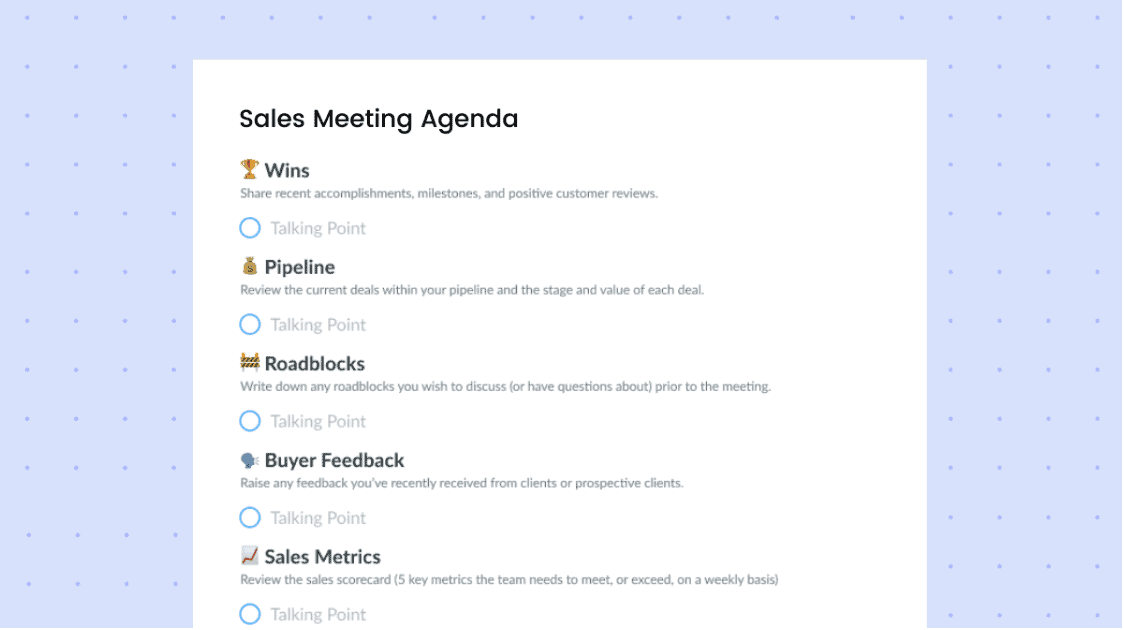We all know how easy it is for a sales meeting to go off the rails.
This is particularly why sales reps cringe at the announcement of another sales meeting, as it feels like an unnecessary time block.
In fact, team members often don’t speak up in meetings or refuse to show up.
The main challenge for a sales manager is to effectively plan and execute a sales meeting for it to be productive. Sales meetings are an intrinsic part of their job, as check-ins ensure that each sales rep is on the right path to achieving their targets.
These targets include acquiring new customers, generating qualified leads, increasing conversion rates, and so on.
In this post, we show how you can strategically plan and run a productive sales meeting that does not last more than 30 minutes.
Let’s get started!
Table of Contents
What Is a Sales Meeting?
Typically, sales meetings are an internal check-in between sales leaders and reps.
They involve sales leaders discussing current sales performance, competitor insights, and goals for the upcoming financial period.
Sales meetings do not include external stakeholders and are usually conducted to provide the sales team with the resources required to do their jobs well.
Depending upon the agenda, sales meetings can be organized weekly, monthly, or quarterly.

However, a lack of plan and repetition of previously discussed topics can result in pointless meetings.
A study has shown that almost two-thirds of sales reps stated that meetings did not have a positive impact on their sales skills, despite 70% of managers claiming to host highly productive meetings.
Let us look at other reasons why sales meetings may fail.
Read also: The Sales CHAMP Framework and How It Can Help Your Business
6-Step Guide to Conduct an Effective Sales Meeting
A lot has been said about why sales meetings fail. But how to do it right?
Here’s a 6-step guide for you to ensure that your sales team is getting the maximum result out of your sales meeting.
#1. State the agenda and goals

It starts with clearly defining the agenda of today’s meeting.
In fact, the ideal way is to share the meeting’s agenda with your team members even before the meeting starts. This way, they get the chance to prepare in advance and list out the questions to discuss.
Surprisingly, most of the time, you don’t even need a meeting.
A simple email or a message on Slack can resolve the issue. So even before you call a meeting, ask yourself, “Do I even need a meeting to resolve this particular issue?”
If a one-on-one Zoom meeting with a sales rep can get things done, you don’t need to call every salesperson for the meeting. If your agenda is specific to a particular goal or issue, invite only those who are directly involved with it.
Read also: How Sales Call Recording Can Improve Your Pitch
#2. Establish meeting norms and etiquette
To ensure that sales meetings are conducted in an orderly manner, the next step is to try and establish meeting norms from the start.
These norms can include:
- Creating a meeting schedule for a given time period
- Confirming the meeting start and end time
- Clearly defining the objectives for every meeting
On top of that, online meetings generally have a different set of etiquette than in-person meetings. For instance, asking everyone to stay mute except for the speaker, testing your audio and video before joining the meeting, and asking questions on the chat box instead of interrupting the person speaking.
It’s crucial that your meeting expectations are clearly communicated so that the meeting can go as smoothly as possible.
Apart from that, as a sales manager, try to foster an empathetic environment where team members are comfortable with providing feedback on their time.
Read also: Sales Blitz Definition, Example, and Strategy
#3. Encourage team members to speak
One of the major reasons why meetings are often perceived as a waste of time is the absence of discussion.
If the meeting only involves the manager speaking, it becomes a passive environment with no room for discussion. Consequently, salespersons begin to lose interest in meetings and stop participating in them.
To execute a productive sales meeting, ensure that every team member has the opportunity to speak.
Encourage them to share new ideas, brainstorm agendas, and ask any questions or address roadblocks. At the same time, you should be mindful of the time. No one likes meetings that extend for hours.
And for sales reps, time is money.
If they spend most of their work hours in meetings, they lose leads, loyal customers, and, ultimately, revenue.
So, how do you ensure that your meetings start and end on time?
It is best to create a schedule and assign time limits for meetings. But make sure that you give them enough time so that it doesn’t discourage or stress them out. In case you anticipate that the meeting will extend beyond the allotted time, it is best to inform your team members beforehand.
#4. Make use of technology
Presentations are an inevitable part of most workplace meetings.
While using technology definitely makes it easier to describe team performance, share insights, and display results, make sure you know how to use it.
These include presentation tools, how to navigate between presentation slides, and any audio or visual aids.
Before the meeting starts, ensure that all applications and devices work smoothly.
There should not be any glitches, as it could lead to delays with the meeting, causing wastage of time.
If you are unfamiliar with navigating a specific tool or software, request your team members or other concerned people for assistance.
Read also: 8 SMART Sales Goals for Business Growth [+ Case Study]
#5. Keep everything in one place
In the midst of meeting deadlines and completing targets, it can be easy to lose track of what to discuss in sales meetings.
This is why you should keep a record of your meetings in one place.
It helps you keep a tab on what was discussed in previous meetings and what to discuss in upcoming sessions.
With sales tools like EngageBay, you can even maintain the minutes of all your sales meeting for easy recordkeeping.
Before ending the meeting, don’t forget to summarize what was discussed.There should always be an action plan so that your sales reps know how to move forward and what goals to achieve.
And then, in the next meeting, you can discuss whether or not those goals were achieved.
#6. Celebrate your team’s wins
Once you have discussed all your objectives and goals, always ensure to applaud your employees who met their targets.
While the common goal should always be to aim higher, it is equally important to praise your team’s accomplishments.
This encourages them to stay motivated and keep performing, knowing that their efforts will be recognized.
Read also: 6 Ways To Make Practically Every Sales Call Close
5 Reasons Your Sales Meetings Are Not Productive Yet
Your sales meeting can feel like a drag where nothing ever gets achieved. But why?
Here are five key reasons your sales meetings may not be up to the mark.

#1. Lack of preparation
Ineffective meetings are one of the most costly overheads within your organization in terms of both monetary and human costs.
Unpreparedness or a vague agenda will make your meetings look like a forced chore, which, in turn, will leave your team members demotivated.
A sales meeting without an agenda or goal only ends up wasting company resources as people tend to discuss irrelevant topics.
This affects their productivity and performance as well.
#2. Lack of consistency
Either a sales manager sets up a lot of meetings, or they frequently keep canceling one.
While the former wastes a lot of time for your employees, the latter disrupts the usual schedule of your sales reps.
Besides, it sends a signal that you, as a manager, are disinterested or uninvolved with your team.
Most importantly, it can hamper team productivity if the manager is unavailable to address concerns or provide members with the resources required to achieve results.
Read also: 6 Ways To Close The Deal With Less Persistence And More Influence
#3. Absence of guidance or motivation
Without realization, sales managers often just highlight their team’s mistakes or weaknesses in an attempt to resolve them.
However, it can ultimately demotivate your sales reps if not done correctly.
The trick is to assess your team’s efforts, discuss their performance, and find solutions to solve them.
But if your sales meeting only includes finding problems with team members, it might even lead to some of your salespeople resigning.
#4. Discussing unimportant topics
When you don’t have a plan, any sales meeting becomes pointless.
Discussing things such as leaves, conveyance costs, and other non-sales-related topics is tempting.
However, if you choose to ignore hiccups faced by your teammates and other pressing issues, the sales meeting becomes a failure.
As a consequence, neither you nor your team is able to gain anything substantive from the meetings, resulting in a waste of time and effort.
Read also: Agile Meetings Uncovered: Are They Really Effective?
#5. Lack of participation
Be it a sales meeting or any other meeting, discussions are a must.
They help exchange ideas, provide different perspectives, and resolve problems collectively.
Though a manager’s role is to drive the meeting agenda, if you are the only one speaking, it will cause other people to lose interest.
Read also: 10 Things to Ensure Your Sales Playbook is Crazy Good
Wrap Up
Sales meetings are a crucial part of any sales manager’s job description.
It should be short and crisp while guiding the team to achieve their targets. They should ensure that all sales reps know their roles and responsibilities and how to meet their goals more efficiently.
In fact, you can even use sales CRM to assign tasks and keep track of every individual’s performance. It gives you a holistic view of how your department is performing, what the roadblocks are, and how you can address them in your next meetings.
Whenever you have a well-defined agenda on your plate, a sales meeting can push your team members to perform better and keep them motivated.
Need a CRM software that streamlines your sales processes and helps your reps close deals faster? Try EngageBay — it’s absolutely free 🙂
